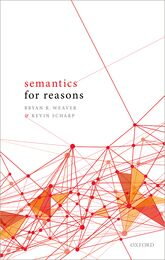
As its title suggests, Semantics for Reasons offers a semantics of reasons locutions. Because talk of reasons plays a leading role in many different kinds of explanation, the book deals with a wide range of issues in the theory of reasons, meta-ethics, epistemology, the philosophy of language, and linguistics.
The primary aim of the book is to present and defend a contextualist semantics of reasons locutions, which the the authors call “reasons contextualism.” A secondary aim is to consolidate insights about the theory of reasons from different philosophical subfields, which have not always been well integrated and have sometimes appeared contradictory, and to use the contextualist theory to weigh in on central debates in the theory of reasons.
In the introduction, the authors introduce the topic with a brief discussion of the traditional emphasis on the meanings of moral terms and the contemporary emphasis on reasons in meta-ethics. Chapter 1 then organizes disparate discussions of different distinctions between reasons into the most systematic set of definitions to date, arguing for six major distinctions. Chapter 2 explicates the logical form of a reasons sentence and argues—contrary to conventional wisdom—that ‘reason’ is not ambiguous in any way but is rather context dependent. The authors introduce reasons contextualism and offer an initial defense of the view against Justin Snedegar and John Skorupski’s constrastivism about reasons. Chapter 3 lays out the basic structure of a semantic theory for reasons locutions, describes different contexts of utterance for reasons locutions, and explains the semantic relevance (or lack thereof) of each of the six major reasons distinctions explicated in Chapter 1. Chapter 4 shows why reasons contextualism is preferable to four major competing views in the literature: viz., Simon Blackburn’s expressivism, Stephen Finlay’s conceptual analysis, Tim Henning’s contextualism, and Niko Kolodny’s relativism. Chapter 5, finally, draws the implications of reasons contextualism for several central issues in the theory of reasons: the ontology of reasons, indexical facts, reasons to be rational, moral reasons, and the reasons first program (which takes reasons to be the central normative phenomenon).